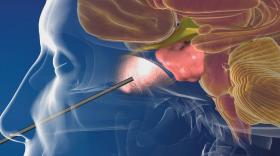
Complex Endoscopic Endonasal Surgery of the Skull Base November 8-11, 2023
This 3-day course highlights both surgical decision making and advanced techniques in endoscopic endonasal skull base surgery (training levels 3-5). Experts in the field will lead interactive case-based discussions on the indications, limitations and technical nuances of the procedures by anatomical site. Focus will be on expanded and coronal plane approaches as well as novel sinus approaches.
The course features lectures (including 3D anatomy), round table discussions, case presentations, fresh anatomical specimen prosection and dissection, and an optional interactive live surgery broadcast on Wednesday, November 8. Participants will also train on a cadaveric-based internal carotid artery (ICA) injury simulator.
https://cce.upmc.com/content/complex-endoscopic-endonasal-surgery-skull-base-november-8-11-2023
Target Audience
This course is intended for experienced skull base teams who wish to refine the technical nuances of endoscopic endonasal surgery of the ventral skull base (training levels 3-5) and apply endoscopic and reconstruction techniques to complex pathologies.
Learning Objectives
Following completion of this course, participants should be able to:
- Describe the key anatomical relationship between the internal carotid artery, basilovertebral complex, intracranial arterial vasculature, cranial nerves, and ventral skull base from an endoscopic viewpoint.
- Determine the appropriate surgical approach for skull base pathology.
- Utilize a variety of vascularized pedicled flaps for skull base reconstruction.
- Identify methods to avoid and manage complications during endoscopic skull base surgery including internal carotid artery injury.
Additional Information
| Attachment | Size |
|---|---|
| 3.32 MB |
Course Directors
Carl H. Snyderman, MD, MBA
Professor of Otolaryngology and Neurological Surgery
University of Pittsburgh School of Medicine
Co-Director, Center for Cranial Base Surgery
University of Pittsburgh Medical Center
Paul A. Gardner, MD
Professor of Neurological Surgery and Otolaryngology
University of Pittsburgh School of Medicine
Co-Director, Center for Cranial Base Surgery
University of Pittsburgh Medical Center
Eric W. Wang, MD
Professor of Otolaryngology, Neurological Surgery and Ophthalmology
University of Pittsburgh School of Medicine
Co-Director, Center for Cranial Base Surgery
University of Pittsburgh Medical Center
Georgios A. Zenonos, MD
Assistant Professor of Neurological Surgery
University of Pittsburgh School of Medicine
Co-Director, Center for Cranial Base Surgery
University of Pittsburgh Medical Center
Garret W. Choby, MD
Associate Professor of Otolaryngology and Neurological Surgery
University of Pittsburgh School of Medicine
Associate Director, Center for Cranial Base Surgery
University of Pittsburgh Medical Center
Course Faculty
S. Tonya Stefko, MD
Professor
Departments of Ophthalmology, Otolaryngology and Neurological Surgery
University of Pittsburgh School of Medicine
All individuals in a position to control the content of this education activity have disclosed all financial relationships with any companies whose primary business is producing, marketing, selling, re-selling, or distributing health care products used by or on patients. All of the relevant financial relationships for the individuals listed below have been mitigated.
The following relevant financial relationships were disclosed:
Paul A. Gardner, MD
Medexus Pharma, Inc. Consultant; Grant Research/Support
Peter Lazic US, Inc. Consultant
Renerva Ownership Interest
SPIWay, LLC Consultant
Sutter Medizintechnik GMBH Consultant
Carl H. Snyderman, MD, MBA
Peter Lazic US, Inc. Consultant
Respair, Inc. Ownership Interest
SPIWay, LLC Consultant
Georgios A. Zenonos, MD
Recursion Pharmaceuticals, Inc. Grant/Research Support
No other members of the planning committee, speakers, presenters, authors, content reviewers and/or anyone else in a position to control the content of this education activity have relevant financial relationships with any companies whose primary business is producing, marketing, selling, re-selling, or distributing health care products used by or on patients.
Accreditation and credit designation
In support of improving patient care, the University of Pittsburgh is jointly accredited by the Accreditation Council for Continuing Medical Education (ACCME), the Accreditation Council for Pharmacy Education (ACPE), and the American Nurses Credentialing Center (ANCC), to provide continuing education for the healthcare team.
Physician (CME)
The University of Pittsburgh School designates this live activity for a maximum of 31.25 AMA PRA Category 1 Credits™. Physicians should claim only the credit commensurate with the extent of their participation in the activity.
Other Healthcare Professionals
Other health care professionals will receive a certificate of attendance confirming the number of contact hours commensurate with the extent of participation in this activity.
Available Credit
- 31.25 AMA PRA Category 1 Credit™The University of Pittsburgh School of Medicine is accredited by the Accreditation Council for Continuing Medical Education to provide continuing medical education for physicians.
- 31.25 Attendance
We gratefully acknowledge educational grant support for this course from the following companies:
COOK MEDICAL, LLC
KARL STORZ ENDOSCOPY-AMERICA, INC.
KLS-MARTIN L.P.
MEDTRONIC, INC.
PETER LAZIC US, INC.
SPIWAY, LLC
STRYKER CORPORATION
SUTTER MEDICAL TECHNOLOGIES USA
We gratefully acknowledge in kind support for this course from the following companies:
Apex Medical, Inc.
Cook Medical, LLC
KARL STORZ Endoscopy-America, Inc.
KLS-Martin L.P.
Medtronic, Inc.
Mizuho America, Inc.
Peter Lazic US, Inc.
SPIWay, LLC
Stryker Corporation
Sutter Medical Technologies USA
If you are interested in attending this course, please complete and return the attached request form to [email protected].
![]() 2022 Course Request Form Endoscopic Endonasal.pdf
2022 Course Request Form Endoscopic Endonasal.pdf

 Facebook
Facebook X
X LinkedIn
LinkedIn Forward
Forward